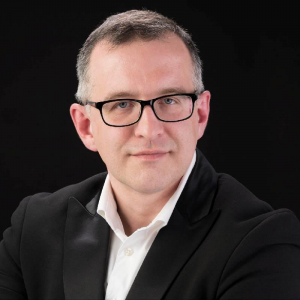About the program
The program provides knowledge on the mechanisms of totalitarianisms of the 20th century, in particular Nazism and the Holocaust, with the focus on the concentration and extermination camp Auschwitz, and other genocides.
The program not only presents innovative teaching methods in the context of such difficult subjects, but it also sensitizes students to human suffering and harm resulting from indifference to extreme attitudes such as antisemitism, racism, persecution, and war.
Over the course of study, we trace the roots of evil and discuss methods of preventing this phenomenon. The biggest advantage of the program is the location where the classes take place, i.e. the Auschwitz-Birkenau State Museum, and the teaching staff that includes experts from the Museum.

It could seem that during this program we talk exclusively about history, but this is not the case. The real goal of the program is to relate it to the contemporary world and show mechanisms of evil, which affect all of us acutely. Here and now. The program also provides students with unique instruments useful in coping with all these threats.
Head of the Program

For whom?
Who should enroll?
- Teachers of history, civics, religion, or ethics
- guides,
- educators,
- employees of museums and memorial sites.
Why should you enroll?

- It is a unique program, unparalleled on the market of post-graduate education.
- Classes take place online and onsite, at the actual Auschwitz Memorial Site.
- You will learn about a wide range of methods and tools indispensable to educators specializing in the topics of Auschwitz, the Holocaust and genocides.
- You will have a rare opportunity to shadow the employees of the Auschwitz-Birkenau Memorial Site, and access the areas that are not open to the visiting public.
- You will receive a diploma issued by the International Center for Education about Auschwitz and the Holocaust (ICEAH).
- The program is offered in English and Polish.

Program details
Program framework
Politics and ideology
20th Century Totalitarianisms — a comparative perspective
(10 hours)
Antisemitism — the birth and rise of the ideology
(10 hours)
National Socialism — the birth and rise of the ideology
(8 hours)
Nazi regime in Germany and the occupied Europe
(8 hours)
Program framework
The Holocaust — a study of different cultures of remembrance
Overview of Jewish history and culture
(12 hours)
Overview of Roma history and culture
(10 hours)
Persecution and genocide of Jews
(16 hours)
Persecution and genocide of the Roma
(12 hours)
Persecution and extermination of Poles
(12 hours)
Prisoners of other nationalities
(4 hours)
The forgotten victims of Nazism
(4 hours)
Program framework
The Holocaust
The role of the Auschwitz concentration camp and other genocides of the 20th century
Nazi German death camps, with the focus on the Auschwitz concentration camp
(22 hours)
The Holocaust and other Nazi crimes in literature
(8 hours)
The Holocaust and other Nazi crimes in film
(8 hours)
Genocides and crimes against humanity in the 20th century
(10 hours)
Program framework
Education at Memorial Sites
Education at memorial sites: theory and practice
(20 hours)
Developing cooperation in education
(4 hours)
Human Rights in the contemporary world
(6 hours)
Concepts of new technologies in education about Auschwitz, the Holocaust, and genocides
(6 hours)
Project seminar
(10 hours)
Learn more about the program. Read an interview with Professor Adam Szpaderski, Head of the program.
Class schedule
The program consists of two semesters, in total 200 teaching hours. Classes take place on Saturdays and Sundays. There are up to two weekend meetings per month. The program is offered in a hybrid format, i.e. the majority of classes take place online, while the last three weekend meetings take place onsite, at the Auschwitz-Birkenau State Museum.
The Center for Professional Education reserves the right to make necessary changes concerning the program, the teaching staff, and the mode of class delivery, should important reasons arise.
To complete the program you must:
- Attend classes, at least 80% of the time
- Pass the final tests, one for each thematic module (passing grade is 60%)
- Submit a project on a selected topic related to the course of study. The final grade on your certificate will reflect the grade you get for your project
Certificate
A certificate (świadectwo ukończenia studiów podyplomowych), issued by SWPS University, and a diploma issued by the International Center for Education about Auschwitz and the Holocaust (ICEAH).

Our Lecturers
Our faculty includes acclaimed experts specializing in the topics discussed during the program.
Head of the Program


Admissions
Application step by step
Eligible candidates are admitted on the first come, first served basis. Please note that the completion of the online Application Form is just the first step in the Application Process and does not signify your admission to the program. We reserve the right to schedule interviews with candidates.
In case of insufficient enrollment, SWPS University reserves the right to cancel the program.
- Complete the online Application Form

- Upload the required documents

- Pay the application fee

- Start learning

Complete the online Application Form
To go the Application Form, click the Apply button below. You will be guided through the whole application process.
To apply, you will need:
- your scanned diploma (in a .pdf or .jpg file format)
- CV, containing your professional experience to date
Upload the required documents
While filling in the Application Form, you will be asked to upload a scan of your diploma and your CV, containing your professional experience to date.
Please note!
- Required file formats: .jpg or .pdf.
- All scans must be of good quality, easily readable.
Pay the application fee
You must pay the application fee via the PayU platform, while completing the Application Form.
Please note!
- Students and graduates of SWPS University are exempt from the application fee.
Start learning
We will notify you by e-mail, sent to the address provided in your application, about the status of your application. We will send a separate e-mail with the admission decision. The information concerning classes will be e-mailed to you seven (7) days before the first weekend meeting.
Please note!
- Number of places is limited.
- Eligible candidates are admitted on the first come, first served basis.

Tuition
Application Fee PLN 300.
Students and graduates of SWPS University are exempt from the application fee.
Tuition for academic year 2025-2026
| amount of installment | fee for the entire program | |
|---|---|---|
| 2 instalments | EUR 675 | EUR 1,350 |
| 1 instalment | EUR 1,250 | EUR 1,250 |
Candidates should pay the tuition fee to their individual accounts. Account numbers are provided on the Virtual University Platform. First instalment of the tuition fee payment should be paid by October 5th, for the cohort that begins classes in the fall, and by March 5th, for the cohort that begins classes in spring.
We will e-mail you class-related information seven (7) days prior to the first weekend meeting. Please check your student e-mail account and the e-mail account you provided in the Application Form.


